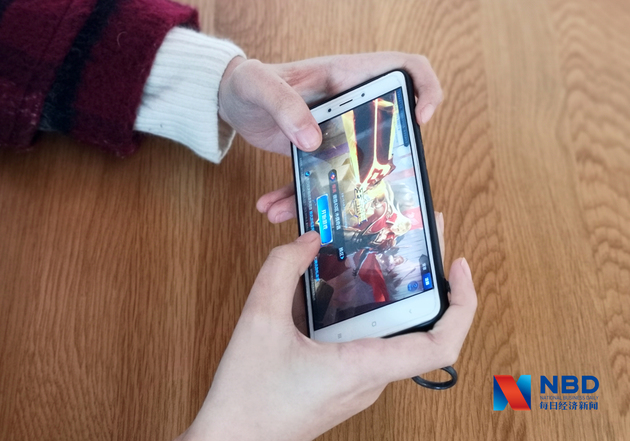May 29 (NBD) -- Tencent denied the rumor on Tuesday that it had lay aside the Arena of Valor (AOV), the international version of mammoth MOBA (multiplayer online battle arena) game King of Glory (KOG), and dismissed the marketing teams for the game in Europe and the U.S., saying the game is now under stable operations globally.
National Business Daily (NBD) found that the offical Twitter account of AOV is constantly updated and the marketing drive for the AOV World Cup 2019 scheduled to kick off in June is still underway.
One of the most lucrative games produced by Tencent, KOG has taken China by storm since it landed in 2015. According to a report from mobile big data service provider Jiguang, as of last October, KOG garnered 60 million daily active users on average, a number dramatically higher than other mobile games, and ranked top in China in terms of the penetration rate.

Photo/Wen Duo (NBD)
Late start in Europe and North America leads to mediocre performance
After KOG reigned supreme in the Chinese mobile game market, Tencent then brought the game to the global arena, but only to find the game failed to become another huge hit as it has been in China.
Data from research institute Sensor Tower shows it took AOV half a year to reach 1 million combined downloads on App Store and Google Play in the U.S. Reports published later said AOV only has 100,000 daily active users in Europe and 150,000 in North America, which is pretty unattractive as compared to KOG's performance in China.
But Tencent refuted the numbers without giving details. Its financial report released in last August indicated the number of daily active users of AOV reached 13 million worldwide as of June 2018.
Data from app analytics and market data provider App Annie shows that AOV now ranks among top 10 in the list of best-selling mobile games in App Store in Southeast Asian countries such as Viet Nam and Thailand, and the top 3 in China's Hong Kong, Macao and Taiwan regions, according to a report by Game Teahouse, a Chengdu-based media platform with a focus on the global gaming industry. But in European and North American countries except Portugal, Spain and Greek, the game doesn't even grab a place among the 100 best-selling mobile games.
"The feature that enables players to interact via social media platforms like WeChat and QQ distinguishes KOG from its counterparts and is the key to its unrivaled success in mainland China," Liu Wei, an analyst from iResearch, said in an interview with NBD. "But the international version of the blockbuster game fell behind in the overseas market since Mobile Legends: Bang Bang, a game similar to AOV, had been released earlier and already won a player base."
Moreover, Chenyu Cui, a game analyst from London-headquartered information provider IHS Markit, added that western game players are inclined to play casual games on smartphones and hardcore games like AOV on computers.
Domestic game firms turn to overseas markets for growth
AOV is not the only mobile game that eyes a slice of the overseas market. In fact, in order to prolong the lifecycle of mobile games, a raft of Chinese game developers have been seeking to make a foray into the global arena.
"There's little room for user increment domestically and with the development of mobile games, the costs of advertising have been multiplied in the Chinese market," Liu Wei explained. "Furthermore, Chinese authorities placed restrictions on game approvals, which also serves as a stimulation for game developers to turn to the global market."
According to a report launched by App Annie, Chinese game developers delivered an overall good performance in overseas markets in 2018. Downloads of games developed by Chinese companies totaled 3.2 billion overseas in the year, a year-on-year increase of 39 percent. User spending on these games reached 6.1 billion U.S. dollars, rising by 49 percent from the previous year. The U.S., Japan and South Korea ranked the top three in terms of user expenditure on Chinese mobile games.
"In Japan, South Korea and some Southeast Asian countries, Chinese mobile game companies have already gained a foothold with anime, simulation, first person shooter games as representatives," Liu Wei noted, "In the European and American markets, Chinese game companies are still at the stage of exploration."
Challenges remain
Despite the eye-catching achievement of many Chinese mobile games in overseas markets last year, challenges still exist.
"The chief problem lies in promotion and advertising. For casual games which couldn't generate considerable profits, developers should manage to control costs, or the margin will be further cut down," Chenyu Cui told NBD.
"While promoting in overseas markets, it is essential to build tie-ups with local partners in addition to carrying out the marketing drive via common channels such as Twitter, Twitch and Facebook," Chenyu Cui said. "However, this is not easy due to issues such as profit sharing and game distribution model."
However, Liu Wei is rather buoyant about the future of Chinese mobile game going global. According to him, Chinese mobile games have advantages in game quality, such as localized user interface design, efficient operations and quick updates.
In Liu's mind, to make breakthroughs in overseas markets, Chinese game companies might better leverage the profound Chinese culture to build the background stories, for example, some Chinese palace-themed games are welcomed by overseas players.
Chenyu Cui echoed the view, saying that IP is an important element, and she stressed the significance of gameplay innovation and channel expansion as well.
Email: lansuying@nbd.com.cn


 川公网安备 51019002001991号
川公网安备 51019002001991号





